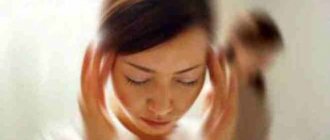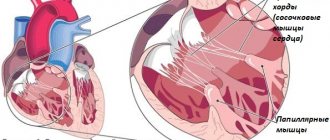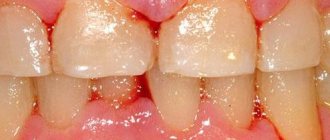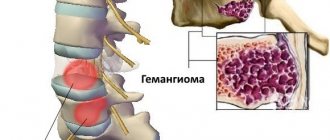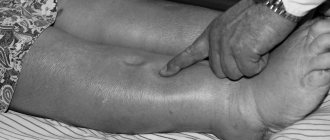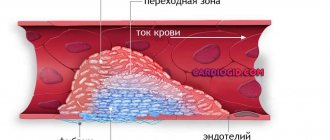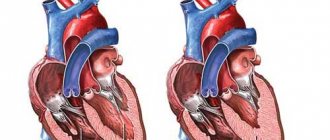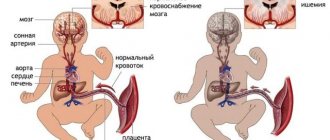Physiological causes
Noise, pulsation and other unpleasant sensations in the ears can occur due to:
- Severe damage to the ear.
- Chronic sinusitis.
- Problems with blood pressure.
- Toxic or food poisoning.
- Mental illness (more prone to schizophrenics).
- Lack of sleep.
- Severe fatigue.
- The presence of neuritis and other injuries.
- Deformations of the Eustachian tube.
- Abscesses.
- Poor hygiene, ear plugs.
- Taking certain medications (aspirin).
Can hypertension cause tinnitus?
Increased pressure is the most common cause of pulsations in the hearing organs. A person feels a pulsating noise due to obstructed blood movement through capillaries and vessels. People suffering from hypertension need to constantly monitor their own blood pressure, and it is better to have it carried out by a qualified doctor.
A general blood and urine test will help determine the presence of this disease. Among the technical means - ECG, pressure gauge. After following all the doctor’s instructions and effectively treating high blood pressure, the pulsating noise disappears.
Otitis
Otitis is an inflammatory process within the middle ear. In this case, noise and pulsation in the ear are localized only on one side. In addition, the person experiences ear and headache pain and loses the ability to hear.
For diagnostics the following is used:
- Otoscope.
- General blood analysis.
- Rarely - audiogram.
- To clarify the stage of the disease, use an x-ray.
The disease occurs when:
- Lack of personal hygiene, contamination of the ear canals.
- Pathological structure of the ear.
- Weak immune system.
For treatment, antibacterial drugs and medications that narrow the walls of blood vessels are prescribed. To avoid the risk of the disease, regularly see a doctor, clean your ears (preferably without using ear sticks, which cause excessive dryness of the ear)
Pathologies of ENT organs
It is very unpleasant when there is a constant pulsation in the ear.
1. Inflammatory process in various parts of the ear and the Eustachian tube, which connects the organ to the nasopharynx. Changes in the auditory analyzer of a pathological nature lead to distortion of sound waves and reduce hearing perception. Against the background of otitis, there is a violation of the outflow of exudate of serous-purulent contents, which increases the noise, causes pulsation and creates an echo effect.
2. Labyrinthitis. This is an inflammation of the inner ear, which occurs against the background of infection with various pathogenic microorganisms. The main symptoms of labyrinthitis are vestibular disorders. Patients experience impaired coordination of motor functions, ataxia, blurred images, nystagmus and various autonomic disturbances, including hyperhidrosis, pale skin and dizziness.
3. Hypersecretion of wax in the ears. Increased secretion of serous secretion can provoke the formation of plugs that require prompt removal. Earwax blocks the ear canals, which can cause hearing loss, inflammation, or throbbing.
Sometimes it pulsates in the left ear. The cause may be osteochondrosis.
Atherosclerosis
This disease has a negative effect on blood vessels and arteries. The presence of atherosclerosis predetermines formations in the form of bulges on the blood conductors, which causes an increase in pressure. With the gradual development of the disease, the brain ceases to function normally, fainting and tinnitus begin.
Previous symptoms:
- ear pain;
- constant fatigue;
- irritability;
- pulsations in temples and ears.
If such indicators are detected, diagnostics are carried out. The examination includes:
- Ultrasound;
- blood pressure measurements;
- angiography.
Atherosclerosis may appear if:
- you are prone to the disease hereditarily;
- have problems with excess weight;
- you don't eat well;
- abuse alcohol.
The atherosclerotic process leads to a loss of elasticity of the vascular walls, which cease to contract in the same rhythm as the heart muscle. Such pathological pulsation can become audible. If the ear is pressed against the pillow, the pulsation becomes especially noticeable. Patients suffering from atherosclerosis often complain of regular dizziness, noise and pulsation in the head, easy fatigue, poor memory and hypertension.
A complex paired organ located in the temporal bones of the bony part of the head is the ear. In addition to its main function (perception of sound vibrations), this organ provides balance and is responsible for the position of the body in space. Anatomically, the ear consists of three parts (outer, middle, inner), the most complex of which is the inner ear, where the receptors of the vestibular apparatus are located.
Pulsating noise in the ears or in one right ear is a consequence of irritation of the hairs of the ciliated cells, as a result of which the order of nerve impulses entering the brain is disrupted and the person hears sound in the absence of an external source. This condition may indicate either short-term disorientation in space due to nervous strain or stress, or a serious pathological process occurring in the body.
In order to determine the pathogenicity of the appearance of noises, it is necessary to identify accompanying symptoms (dizziness, loss of coordination, pain) and determine the nature of the sound (dull, clicking, ringing, monophonic). This disorder cannot be ignored due to the fact that it can lead to negative health consequences, such as sleep disturbances, depression, and mental disorders.
Pulsating noise in one ear coinciding with heartbeat
Persons suffering from cardiac pathology quite often experience tinnitus, reminiscent of a heartbeat. The pulsation is especially acute when the patient climbs stairs or bends forward. He feels pressure in his head, lack of air, and noise in both ears.
- With hypertension, vascular tone is disrupted, capillaries become overfilled with blood, and systemic blood flow becomes difficult. The sound of blood “friction” through the vessels is perceived by a person as a pulsating noise. “It’s as if the heart is pulsating in the ears” - this is how patients characterize this phenomenon. If a hypertensive crisis develops, the flow of blood into the vessels of the inner ear becomes uneven. This stimulates the nerve endings, which also results in pulsation in the ears.
- Atherosclerotic processes lead to loss of elasticity of the vascular wall, which ceases to contract in the same rhythm as the heart. Such pathological pulsation becomes audible. If the ear is pressed against the pillow, it becomes especially noticeable. Patients with atherosclerosis complain of regular dizziness, noise and pulsation in the head, easy fatigue, poor memory, and hypertension.
- Disruption of the structure and functioning of large arteries and veins, their narrowing or stratification changes the speed and direction of blood flow, which hits the walls of blood vessels. Patients claim that their ear throbs, but it does not hurt. Small aneurysms manifest themselves as pulsations in the head. The larger the size of the protrusion, the more pronounced these unpleasant sensations are.
Pulse in the ear is not a pleasant sensation. In medicine, this phenomenon is designated by a special term - tinnitus. The causes of pulsation in the ear are quite harmless, but not always. This symptom causes discomfort to a person and can greatly complicate life, regardless of what caused it; there are a number of explanations for this.
Pulsating tinnitus can cause hearing impairment, insomnia, aggression and irritability, decreased appetite and other disorders, which in turn give rise to other diseases. Often, pounding in the ears signals dangerous diseases that require serious attention and treatment.
Let's look at the main causes of pulsating noise in the ear. They can all be divided into 5 groups:
- associated with problems of the heart and blood vessels;
- associated with diseases of the middle and inner ear;
- associated with various types of injuries;
- tumor-related;
- other reasons.
Let's try to describe each of the listed groups in more detail.
Cardiovascular system disorders that can cause tinnitus include:
- Hypertension and hypotension, that is, high or low blood pressure. With these pathologies, a person’s vascular tone is disrupted, as a result of which the blood pressure in the inner ear is insufficient in one case, and in the other it fills the capillaries too intensely. Thus, the sound of “friction” of blood against the walls of blood vessels arises; this is pulsation in the ear.
- Atherosclerosis. A pathology that reduces the elasticity of blood vessels, which causes their inability to contract in the rhythm in which the heart beats. A pulse becomes audible, which stands out from the general rhythm.
- Various structural features of blood vessels that create increased blood flow. The sound that occurs when blood flows hit the walls of blood vessels is perceived by a person as pulsation in the ears. Such anatomical defects include, for example, a too narrow opening of the carotid artery or jugular vein.
If the cause of the discomfort is heart and vascular disease, then it will not be difficult to determine this. In such cases, the pulsation becomes audible when a person overexerts himself, carries too heavy things, climbs stairs or bends, and feels dizzy.
Among the diseases of the middle and inner ear, the symptom of which may be pulsation, it is worth highlighting the following:
- blockage with sulfur plug;
- inflammation of the middle ear, medically called otitis, in which there is a violation of the outflow of fluid;
- an inflammatory process in the cavity of the inner ear, for example localized in the Eustachian tube.
If an inflammatory process occurs in the bone structure, there is a possibility of disruption of the auditory cells responsible for converting acoustic impulses into electrical ones. With this distortion, ear ringing and audible noise often occur.
Knocking in the ear can occur as a result of damage to any of the ear parts, as well as due to traumatic brain injury. The reason for this is impaired blood circulation in the area of the bruise and the development of edema. If there has been an injury to the middle or internal part of the organ, there may be a noticeable deterioration in hearing, in which case the ear may hurt.
If, in addition to the presence of sounds, your ear also constantly hurts, you should be wary. A benign or malignant tumor in the brain or spinal cord, neck, or auditory nerve may also explain why there is a knocking in the ear. An increase in the size of the tumor can lead to the fact that the blood supply to nearby vessels will be complicated.
There are other causes of pulsation, these include:
- Age-related organic changes. As a person ages, various changes occur in the hearing organs. Sound signals entering the ear can be distorted, causing the friction of blood against the walls of blood vessels to be heard.
- Hormonal changes. Often, a feeling of pulsation is characteristic of pregnant women and appears due to swelling of the mucous membranes. The development of edema is caused by an imbalance of water and salt in the body.
- Medicines. For example, long-term use of Gentamicin or Aspirin by a patient can lead to structural changes in the cells of the inner ear. This explains the deterioration of hearing and the appearance of noise.
- Listening to music on headphones at high volume for a long time.
People often ask the question: what to do if I hear a pulse? The presented list does not cover all the reasons, so it is very important to consult a doctor in a timely manner. After all, only a specialist can determine the causes and treatment of this pathology.
Since pulsation is by no means an independent disease, but only a symptom of something more serious, it is necessary to treat the illness that caused this unpleasant sensation. Accordingly, treatment methods will differ depending on the disease; in one case, the use of ear drops and ointments will be sufficient, while in another, antibiotics or even surgery may be necessary.
For ear pathologies, the otolaryngologist may prescribe to the patient:
- drops and ointments;
- washing with antiseptic agents;
- course of antibiotic treatment;
- physiotherapy;
- warming up, etc.
If the cause is cardiovascular problems, your doctor may recommend:
- B vitamins;
- drugs for vasodilation;
- sedatives;
- blood thinners and others.
The following may help in the fight against pulsation:
- Massage of the upper spine, cervical areas and lower part of the head.
- Hearing aid hygiene (regular cleaning, rinsing, removing wax plugs). It is worth replacing ear sticks with cotton wool turundas, since the former can easily cause injury in the ear canal.
- Reducing the time spent listening to music on headphones. The permissible norm is no more than 20 hours per week at low sound volume. It is important to treat each earphone with alcohol after use.
- Pneumatic massage of the eardrum. The procedure improves hearing and gets rid of noise.
- Long walks. If a person spends enough time in the fresh air, this has a good effect on his general condition, in particular on blood pressure.
- Wearing hats at low temperatures. This will help prevent the occurrence and development of inflammatory processes or infectious diseases.
Traditional medicine also has recipes that will help get rid of ear discomfort:
- After cutting out the middle of the onion, stuff the rest with a few cumin seeds and bake in the oven for 10 minutes. Then squeeze the juice out of it and instill 3 drops 3 times a day.
- Steam fresh viburnum berries with boiling water, leave for 10-15 minutes, then drain the water. Grind the berries into a homogeneous mass, add honey (1:1). Soak gauze swabs in this solution and insert into the ear, leaving overnight.
To avoid aggravating the condition, the patient is not recommended to:
- stuffing any objects into the ear;
- be near sources of loud sounds;
- be exposed to stress;
- smoke;
- abuse coffee or alcohol;
- overexert;
- overwork;
- self-medicate.
If pulsation occurs due to age-related characteristics, then it is not always possible to completely get rid of it. Then a person simply has to adapt.
The ear is a very important organ that requires special attention. If the problem is not taken seriously, it can lead to serious consequences, such as hearing loss. Therefore, as soon as you notice the feeling that blood is pulsating in your ear, do not put off visiting a doctor.
The sound of a heartbeat in the ears does not just appear. As a rule, it indicates the presence of a serious illness. Before starting treatment, it is necessary to find out exactly the cause of such a symptom. This article discusses the main factors that cause pulsating ears.
1. Hypotension or hypertension. Problems with blood pressure reduce vascular tone. The consequence of this is a change in pressure in the inner ear. The result is pulsating tinnitus.
2. Violations of the condition of veins and arteries. If you suffer from narrowing of the carotid artery or jugular vein, then tinnitus should not surprise you. The pulsation becomes audible due to the creation of turbulent blood flow in the areas of narrowing.
Osteochondrosis
When diagnosing osteochondrosis, the doctor identifies excessive pressure of the cervical discs on the vessels, which leads to an increase in blood pressure. Blood ceases to fully supply the brain, organs of hearing and vision. This is why there is pulsation in the ears, loss of vision, headache and neck pain.
To get rid of the disease, and therefore tinnitus, special massages, medications and therapies are prescribed. Reasons why osteochondrosis occurs:
- Improper walking and rest.
- Atrophied neck and back muscles.
- Improper metabolism.
The disease is a degenerative-dystrophic pathology of the spinal column, which is accompanied by deformation of the vertebrae. The distance between the affected vertebrae gradually decreases, due to which the vessels of the circulatory system and nerve roots are compressed. Blood cannot circulate in the usual way, there is a failure in tissue nutrition, as well as innervation of the sense organs and the brain.
During an exacerbation, patients experience constant noise and congestion in the ears, reminiscent of pulsation. There is no pain syndrome, but the pulsation can be either pronounced or insignificant. It can be so strong that it becomes difficult for a person to move their head.
Ringing in the ears does not allow a person to move freely and forces him to remain in an immobilized position. If the pulsation is not pronounced, it causes only minor discomfort, which is ignored by patients at the initial stage. It is typical for this symptom to go away when the head is in a certain position.
In addition to tinnitus, against the background of osteochondrosis, pain in the temples and back of the head may appear, sleep disturbances, ringing, clicking, whistling and crackling in the ears, decreased visual perception, memory impairment, increased pressure in the arteries, and numbness of the hands.
Therapeutic measures
Ringing in the ears is not an independent disease, but only a symptom indicating various pathologies, among which there are quite serious ailments. If this condition occurs, you should consult a doctor to find out the cause of the pulsation. To make the correct diagnosis, the therapist examines the patient and refers him to specialized specialists, such as an angiosurgeon, psychiatrist, audiologist, neurologist, otolaryngologist, etc.
There are drugs that improve cerebral circulation, reduce irritation of the nervous system, and normalize cardiac activity . They should only be prescribed by narrow specialists. In addition, for pounding in the ears, the doctor may prescribe physiotherapeutic procedures, and for some serious diseases, surgical intervention is performed or prosthetic elements of the hearing organ are used.
Thus, pulsation and pounding in the ears can cause various diseases, both harmless and quite serious. The noise may appear at rest or after exercise and is accompanied by dizziness, tachycardia and other symptoms. In this case, the help of a doctor is required.
Other reasons
Another important factor that can cause pulsating noise in the left ear, as well as in the right ear, is brain injury. These are dangerous conditions that pose a danger to the health and life of the patient. Against the background of a traumatic brain injury, blood flow in the hearing organs is impaired, swelling and other symptoms of the inflammatory process appear.
If a person is completely healthy and no pathological processes are observed in his body, pulsation in the ears may indicate severe fatigue, as well as being in a state of stress. If a person spends the working day under stress in an uncomfortable environment, pulsation may be observed in the ears.
The causes and treatment of pulsating tinnitus are interrelated.
Possible complications from pulsation in the ear
As mentioned earlier, tinnitus is only a consequence of the disease. Ignoring this symptom can lead to serious complications. The appearance of noise due to the development of a benign tumor is a signal that it is necessary to begin treatment before the tumor process passes into the malignant stage.
Otitis and other ear inflammations can lead to hearing loss or complete deafness. A pulsating noise will indicate that pathology has begun to develop and treatment is necessary. Blockage of blood vessels and poor circulation in the brain lead to heart attacks and strokes.
Treatment: recommendations from specialists
The audible pounding in the ears repeats the person's pulse. It is felt especially strongly at night, when there is silence. Tinnitus occurs in most cases due to diseases of the cardiovascular system. Other factors are associated with inflammatory processes, spinal diseases and fatigue.
A list of the main reasons will help you find out why you can clearly hear your heartbeat in your ears:
- arteriovenous malformation of cerebral vessels;
- high blood pressure;
- advanced atherosclerosis.
The stated causative factors are associated with disturbances in the functioning of the heart and vascular diseases. They contribute to increased tinnitus in a supine position and can pose a danger to the patient’s life. They are characterized by a rapid transition to a chronic form and gradual progression, provoking various disruptions in the body.
There are also less common reasons why you can hear a heartbeat in your ears:
- cervical osteochondrosis;
- chronic fatigue;
- exposure to certain drugs;
- the presence of inflammatory processes in the body.
If high blood pressure is detected from 140/90 mm Hg. Art. We are talking about arterial hypertension. If it is detected only once, then the problem lies in the influence of irritating factors. A persistent increase in blood pressure indicates hypertension. It is characterized by narrowing of blood vessels, which leads to brain hypoxia. Due to the gradual increase in oxygen deficiency, the heart begins to pound in the ears.
The following factors influence the development of hypertension:
- excess weight;
- age over 60;
- use of hormonal drugs;
- smoking;
- alcohol consumption;
- incorrectly composed diet;
- physical inactivity (sedentary lifestyle).
When several factors are combined, the likelihood of developing blood pressure problems increases significantly. To make a diagnosis, a tonometer and an electrocardiograph (ECG) are used. It will be necessary to take several measurements on different days and times and study the electrical activity of the heart.
With arterial hypertension, the patient experiences ringing in the ears, spots before the eyes, dizziness, and tachycardia (rapid heart rate). Sometimes you may have a headache and sweating.
As a treatment, medications are usually used to reduce the load on the heart, dilate blood vessels and reduce the frequency of contractions:
- Beta-blockers (Sotalol, Timolol);
- Diuretics (“Torasemide”, “Furosemide”);
- ACE inhibitors (Captopril, Enalapril).
The attending physician should select medications based on the diagnostic results and the patient’s condition. It is necessary to combine drug treatment with lifestyle correction:
- make a proper diet;
- avoid stressful situations;
- give up alcohol;
- quit smoking;
- devote at least 7-8 hours a day to sleep;
- exercise at a moderate pace;
- avoid physical overload;
- lose weight.
Atherosclerosis
With atherosclerosis, fatty plaques form on the walls of blood vessels, narrowing their lumen. Disruptions in hemodynamics gradually appear. There is a pronounced palpitation in the ears as blood flows through the area of deposits. The disease is characterized by a chronic course. If treatment is not completed in a timely manner, various complications develop (cardiac ischemia, thromboembolism).
In the presence of atherosclerotic deposits in the cerebral vessels, the following symptoms appear:
- decrease in cognitive functions (memory, intelligence, attention);
- sleep problems;
- hearing loss;
- dizziness;
- headache;
- sense of anxiety;
- fast fatiguability.
Timely treatment of atherosclerosis allows you to avoid consequences. It includes the following groups of drugs:
- Statins (Pitavastatin, Rosuvastatin) slow down cholesterol synthesis.
- Nicotinic acid is prescribed to dilate blood vessels and relieve spasms.
- Fibrates (Gemfibrozil, Clofibrate) reduce the level of organic fats and normalize blood microcirculation.
Treatment of atherosclerosis lasts for 2 months. A repeat course is carried out after six months. Advanced cases require surgical intervention.
Arteriovenous malformation is a congenital form of abnormal vascular communication. It is characterized by blood flowing from the arteries directly into the veins. The patient begins to hear tinnitus and suffer from high blood pressure. The presence of ringing is determined using a stethophonendoscope. The anomaly is accompanied by headache, fatigue, increasing weakness and dizziness. It is removed surgically. Medicines are used only as symptomatic treatment.
Osteochondrosis
Osteochondrosis is a disease characterized by deformation of the intervertebral discs. Its most dangerous and widespread location is considered to be in the neck area. The vessels supplying the brain pass through here. When they are pinched, the patient begins to hear ringing in the ears due to impaired blood supply. Osteochondrosis is accompanied by other symptoms:
- pain radiating to nearby tissues;
- decreased visual acuity;
- cognitive impairment;
- sleep problems.
The following instrumental methods are used for diagnostics:
- computed and magnetic resonance imaging (CT and MRI);
- radiography.
The treatment regimen consists of non-steroidal anti-inflammatory drugs (Diclofenac, Indomethacin) and tablets to improve metabolic processes (Vestibo, Cavintona). As a supplement, you can do massage and exercise therapy.
If the focus of the noise is localized on only one side, we can talk about ear inflammation (otitis media). The pathological process is accompanied by the following symptoms:
- aching and stabbing pain;
- temperature increase;
- hearing loss;
- dizziness.
An otolaryngologist should be involved in making a diagnosis and drawing up a course of treatment. He will examine your ears using an otoscope and recommend a blood test. Additionally, X-rays of the temporal region may be required.
To eliminate the inflammatory process, antibacterial tablets (Ampicillin trihydrate, Netilmicin) and drops (Sofradex, Otipax) are used. Treatment is carried out under the strict supervision of a doctor. The patient should strictly follow the prescribed treatment regimen and come for examination at the specified time. The specialist will evaluate the result of treatment and, if necessary, extend the medication.
Overwork
Tinnitus does not have to be the result of illness. Sometimes it indicates overwork. Trying to quickly relax after a hard day, a person, being in an emotionally heightened state, listens to all surrounding sounds on a subconscious level. At this moment, he even hears the movement of blood through the vessels and feels the pulsation in the body.
Sedatives (Phenibut, Afobazol) will help relieve nervous tension and help you fall asleep faster. To avoid such situations, it is advisable to do breathing exercises and adjust your daily routine. In severe cases and in the presence of mental disorders, the help of a psychotherapist will be required.
Pulsation in the ear is not an independent disease, it is just a sign of a pathological process, sometimes not related to the hearing organs. To eliminate a symptom, it is necessary to identify the cause of its occurrence. Pathological processes that are accompanied by pulsation in the ear can be diagnosed by various specialists, including an otolaryngologist, angiosurgeon, neurologist and oncologist.
1. Observe hygiene procedures, regularly clean your ears and remove any plugs that have formed.
2. Stop smoking and drinking alcohol.
3. Massage the head and neck.
4. Do not listen to loud music, especially with headphones.
5. If necessary, take psychotropic and sedative medications.
6. Spend more time outdoors.
7. Include more fresh fruits and vegetables in your diet.
8. Include physical activity, sports, therapeutic exercises for the neck.
9. In the cold season, be sure to wear a hat.
10. Normalize the pressure in the arteries.
11. Treat seasonal colds in a timely manner.
Along with drug therapy, the recommendations listed will help improve the patient’s condition and prevent a recurrence of what is pulsating in the right ear.
The choice of medications depends on the cause of this condition.
How to get rid of noise
Before starting treatment for pathology of the right ear, the exact cause of its occurrence should be determined. If the disease is determined to be idiopathic (the cause has not been established), therapy consists of taking sedatives and undergoing a course of physiotherapy. Special hearing aids can be used to mask unpleasant signals and relieve ear strain. During treatment, the presence of ear nerve irritants (loud music, alcohol, toxic drugs) should be limited.
To eliminate the pathogenic causes of noise, drug therapy, physiotherapeutic procedures and, if necessary, surgical intervention are used. If the factor provoking auditory signals is an oncogenic tumor, its removal and a course of radiation therapy are required.
| Activation of body systems | Treatment of otitis media | Removing wax plugs | Therapy for osteochondrosis | Normalization of the cardiovascular system and brain function |
| Sedatives – Persen, Tenoten | NSAIDs – Otinum, Otpax | Cerumenolytics – A-Cerumen, Otipax, Vaxol | NSAIDs – Voltaren, | Antihypoxants – Antisten, Actovegin |
| Glycosides – Strophanthin, Convallatoxin | Glucocorticoids – Anauran | Hydrogen peroxide | Nootropics – Vinpocetine, Phezam | Vasodilating agents – Vasobral |
| Antihistamines – Suprastin, Claritin, Loratidine | Antibacterial drugs and products containing antibiotics - Normax, Amoxiclav, | Nootropics – Cerebrolysin, Piracetam | ||
| Immunomodulators – Lykopid, Polyoxidonium | Probiotics – Linex, Acipol | Antihypertensive drugs – Bisoprolol, Maxonidine | ||
| Vitamins A, B1, B2 | Analgesics – Paracetamol, Ibuprofen | Diuretics – Hypothiazide |
Cerebrovasodilating agents are used to treat neurological disorders caused by circulatory disorders and accompanied by decreased hearing acuity. Drugs in this group include Vinpocetine. Taking this drug causes a decrease in blood pressure and normalizes blood supply to the brain:
- name: Vinpocetine;
- description: a vasodilator that helps improve the supply of glucose and oxygen to the brain, reduces blood viscosity, and has a relaxing effect on vascular smooth muscle;
- advantages: high efficiency, fast action;
- cons: presence of side effects.
To solve one of the most common problems that causes noise in the ear, ear drops are prescribed. This remedy is effective for the accumulation of sulfur secretion in the ear canal. A drug that promotes gentle and safe removal of the plug is RemoVax drops:
- name: RemoVax;
- description: allantoin-based drops have a softening effect on dense sulfur plugs, facilitating its leaching from the ear canal;
- pros: safe for patients of all age groups;
- cons: may cause dizziness.
Folk remedies
You can alleviate the condition of noise in the ear using traditional medicine recipes. Homeopathic remedies should be used as complementary therapy along with traditional treatment. Effective ways to eliminate unpleasant symptoms are compresses, instillation of decoctions of medicinal plants and taking infusions prepared according to the following recipes:
- A decoction of currant leaves. To prepare the product, you need to take equal parts of black elderberry flowers, lilac, and currant leaves. 2 tbsp. l. pour the mixture with 2 glasses of water and boil for 20 minutes. Cool the broth, strain and take 70 ml 3 times a day until the noise in the ear disappears.
- Viburnum juice compresses. Grind a few viburnum berries with a teaspoon of honey, wrap the mixture in a bandage or gauze and insert the resulting swab into the ear. The procedure is carried out daily for 14-21 days.
- Instillation of onion juice. Stuff one medium onion with cumin seeds and bake in the oven. Squeeze the juice from the cooled onion, which should be instilled in the ear, 2-3 drops twice a day until the unpleasant symptoms disappear.
Prevention
In order to prevent such a phenomenon as pulsation in the ear, it is necessary to take precautions when cleaning the external auditory canals and perform the following simple preventive measures:
- reduce the intake of aspirin-containing medications;
- limit or completely eliminate alcohol consumption;
- avoid hypothermia, injuries, damage to the head and ears;
- limit consumption of foods containing cholesterol and salt;
- get rid of bad habits (smoking, overeating);
- avoid sharp, loud sounds;
- reduce the time you use headphones.
If you want to avoid all kinds of hearing diseases and tinnitus, change your diet. Eat more fruits and vegetables. Play sports, do massages and neck exercises. Watch your posture and avoid stress. If you suffer from insomnia, consult a psychotherapist, he will help you solve this problem. Insomnia causes fatigue, which in turn causes pulsating noise. See your doctor regularly and take care of your health.
Drug therapy
1. Drugs that improve blood circulation in blood vessels - Piracetam, Vinpocetine, Cerebrolysin.
2. Drugs for normalizing cardiac function - Digoxin, Korglykon, Strophanthin.
3. Sedative medications – “Persen”, “Novopassit”, “Tenoten”.
4. Physiotherapy, including ultrasound, magnetic therapy, laser treatment, microcurrent, Sollux and UHF heating.
Otherwise, treatment depends on the cause that caused the pulsation in the ear. If it is otitis, then treatment is carried out with anti-inflammatory and antibacterial drugs. If wax plugs form, they will need to be removed in a hospital or at home, depending on the depth of its localization.
Osteochondrosis is treated by taking NSAIDs, various painkillers, as well as vitamin complexes and performing special exercises. Diseases of the heart and blood vessels also require certain treatment regimens, which are prescribed by a specialist.
We looked at what a situation in which there is a pulsation in the ear means. Causes and treatment have been described in detail.
Labyrinthitis
In case of inflammation of the inner ear, the explanation for why the ear pulsates is somewhat different. Labyrinthitis is a severe process that is a complication of purulent otitis media, meningitis, or can develop as a result of injury. Exposure to a bacterial, toxic agent, or traumatic damage to the nerve endings of the cochlea leads to pathology of the sound-receiving section of the hearing organ. The consequence of this is a sensation of pulsation in the ear.
Since the inner ear is also an organ of balance, damage to this part of the ear is accompanied by the presence of a number of additional symptoms that make it possible to clarify the diagnosis and determine treatment tactics. Among them:
- gait disturbance;
- dizziness;
- inability to stand upright;
- balance disorder;
- nausea;
- vomit.
Depending on the extent of damage to the inner ear, permanent hearing loss may develop on the affected side. In addition to the otolaryngologist, a neurologist is involved in the study of this pathology. Therapeutic measures include both therapeutic measures and surgical treatment aimed at sanitizing the purulent focus or even removing the labyrinth with further drainage of the cranial cavity.
Therapeutic actions involve the prescription of antibacterial and anti-inflammatory drugs, neuroprotectors, and drugs that improve microcirculation of the inner ear.
Due to labyrinthitis, the lost functions of the auditory nerve are not restored.
In the future, hearing aids or hearing restoration surgery will be necessary.
Etiology of the disease
So, why do my ears throb?
The causes of pulsation are very diverse. These include:
- Infectious and inflammatory diseases of the auditory analyzer.
- Presence of closed and open head injuries.
- The occurrence of vascular diseases in the form of atherosclerosis, hypertension, various vascular malformations, and so on.
- The influence of stressful situations.
- The appearance of neoplasms of the head and neck.
- The appearance of wax plugs in the ears.
- Long-term therapy with antibiotics, especially ototoxic ones.
- Long-term use of non-steroidal anti-inflammatory drugs.
- The influence of a hormonal surge during pregnancy, and, in addition, against the background of menopause.
- Degenerative and dystrophic changes in the spine.
- Daily use of headphones.
- Pressure surges associated with air travel, diving, climbing mountains, and so on.
- The beginning of the natural aging process of the body.
Why the ears pulsate is of interest to many.
Traumatic injury and description of symptoms
People who suffer from heart disease can often experience tinnitus that sounds like a heartbeat. The pulsation can be especially acute when the patient climbs stairs and bends forward. A person may feel pressure in the head, feeling short of breath along with noise in both ears.
Why does the right ear or left ear pulsate?
Brain injuries are a very dangerous condition that threatens the health and life of people. With such injuries, the blood supply to the auditory organ is interrupted, swelling occurs along with other signs of inflammation. This leads to dysfunction of auditory cells, and, in addition, to disruption of sound perception and sound conduction. Throbbing with a pressing headache intensifies when a person begins to move his head.
Overwork
In healthy people, the occurrence of pulsating tinnitus is a sign of fatigue, exhaustion of the nervous system and chronic stress. At the end of a busy day of work, which is spent in an uncomfortable and noisy environment, your ears may begin to throb. Intrusive noise at night prevents people from falling asleep, resting and relaxing.
Tired people can listen to everything, falling into depression and starting to invent a non-existent illness. If drug treatment does not help cope with this problem, then the help of a psychotherapist is required.
Other reasons include the following factors:
- Pulsating pain in the ears appears in patients who suffer from cancer pathologies. Brain tumors, along with acoustic neuromas, can grow rapidly and compress the main vascular and nerve bundles of the neck. This leads to the appearance of painless pulsation, and, in addition, to unilateral hearing loss and disturbances in facial expressions and speech.
- Hormonal changes that occur in the body of pregnant women lead to disruption of water and electrolyte balance, swelling of the mucous membrane of the hearing organs. That's why you can hear blood pulsating in your ears.
- As a person ages, all sorts of degenerative and atherosclerotic processes can develop in the body; among other things, the functions of auditory cells are disrupted, and at the same time, acoustic signals are distorted and a constant background noise arises.
- The onset of multiple sclerosis is a chronic disease characterized by the destruction of the myelin sheaths of nerve fibers. It is also accompanied by slow transmission of nerve impulses. Patients may develop paralysis with paresis, and it is possible that breathing problems and tinnitus may appear.
- Depression, along with neuroses, can manifest itself as psychogenic noise, and, in addition, pulsation in the ears. Stress, combined with nervous overstrain and lack of sleep, exhausts the human nervous system. Against the background of all this, neurasthenia may develop, manifested by excessive fatigue, and along with this conditions such as insomnia, irritability, depressed mood, pulsation, noise in the head and headaches. Why else is there a pulsating knocking sound in the ear?
- Long-term use of drugs such as Gentamicin, Streptomycin, Haloperidol, Furosemide or Aspirin can cause damage to the structure of the inner ear and cause hearing impairment.
- The cause may also be occupational hazards, against the background of which hearing loss develops. We are talking about increased noise levels in production.
- People suffering from chronic sinusitis often complain that their ears are blocked and there is pulsation in them. In this case, pressing sensations may occur in the head, sound perception decreases, and autophony with monotonous noise is observed. If the stuffy ear pulsates very strongly, and at the same time also hurts, then you need to visit an otolaryngologist. The fact is that such symptoms are characteristic of otitis media, which becomes a complication of inflammation in the maxillary sinuses. And this is not at all surprising, since there is a close connection between the organs, which contributes to the migration of infection.
- Poisoning of the body with poor-quality food, and, in addition, with narcotic and sleeping pills, can manifest itself as vomiting and diarrhea, an increase in temperature, and at the same time pulsation and tinnitus. Chills, lightheadedness, weakness, convulsions, and so on cannot be ruled out.
- Alcohol abuse.
If the cause of the pathology cannot be established, it is called idiopathic. We found out why it pulsates inside the ear.
Next, we will consider the main ways to eliminate this disease.
Possible complications
Pulsation in the ears and the inability to suppress it cause severe discomfort to a person. Prolonged stay in this state can cause mental disorders and lead to changes in feelings, perceptions, thinking and behavior. Complications that arise from auditory hallucinations may be the following:
- increased irritability;
- insomnia;
- memory impairment;
- impaired concentration;
- chronic fatigue;
- rarefied breathing;
- depressive state.
If the cause of noise effects in one ear is pathological processes, then the consequences of such a condition can be much more serious, even fatal. The presence of a tumor or neuroma of the auditory nerve can lead to complete or partial hearing loss. Infection of the middle ear threatens to spread the infection to other organs and systems, which is fraught with pulmonary edema and hypoxia. In the absence of timely medical assistance, complications that arise may be irreversible, so it is important to go to the hospital in time.
Remedies
There are the following ways to eliminate this disease:
- Ripple does not act as an independent disease, but only serves as a symptom of the presence of another, more serious illness. In this regard, a person needs to treat his underlying illness (for example, he may need to treat inflammation with infections of the inner ear). Such measures will automatically eliminate the symptoms of pulsation in the ears.
- Carrying out a massage of the neck area will certainly help to stop the presence of pulsation inside the organ.
- It is important to find out in advance why it is pulsating in the left ear or in the right. Among other things, you need to eliminate or reduce the amount of alcohol consumed. In addition, it would be a good idea to quit smoking.
- Hearing aid hygiene is equally important. It is very important to take care of your ears and remove wax plugs in a timely manner. It is also necessary to stop using ear sticks. The fact is that they can very easily injure the eardrum. The skin of the ear canal can easily be injured, which can lead to infection. Ear sticks should be replaced with turundas made of cotton wool or bandage.
- You can listen to music on headphones no more than twenty hours a week. The music volume should always be low. After each use, the headphones must be disinfected with alcohol.
- Sometimes, it is advisable to use psychotropic medications in the form of “Doxepin” or “Amitriptyline” (usually taking one pill once a day after meals). Such medications help improve the tolerance of pulsations, but the use of drugs must be coordinated with a doctor.
- It is advisable to perform pneumatic massage of the eardrum. With the help of this manipulation, hearing improves, and pulsation also decreases, as the eardrum becomes toned.
- Taking long walks in the fresh air can help reduce pulsating tinnitus. Staying in the fresh air perfectly normalizes blood pressure, improving a person’s mood.
During the cold season, it is necessary to use hats in order to prevent the occurrence of infectious and inflammatory pathologies.
We looked at why the ear throbs without pain.
Diagnostics
To determine the cause and nature of the appearance of extraneous noise in the right ear, a set of diagnostic measures is carried out, which include collecting an anamnesis and using research techniques. During the interview with the patient, the doctor finds out the etiology of the noise and its nature. A necessary step during diagnosis is an examination, which includes the study of all parts of the right ear, ear canal and nerve.
Based on the clinical picture, the otolaryngologist determines further measures to identify the exact cause of noise in the right ear, and the following types of diagnostics can be used:
- palpation diagnostics - painful areas are determined using a metal rod;
- otoscopy – examination of the external auditory canal using an otoscope;
- audiometry – diagnosis of hearing acuity, carried out by an audiologist using an audiometer or tuning fork;
- Dopplerography - identifying disturbances in the movement of blood through vessels using ultrasonic waves;
- vestibulometry – assessment of the functioning of the vestibular apparatus using a set of procedures (caloric test, rotational, pressor, otolith reaction);
- angiographic study - an X-ray study using a radiopaque substance injected into the inner ear;
- Valsalva maneuver - assessment of the state of the autonomic nervous system through a test involving forced exhalation of air with the mouth and nose closed;
- dehydration tests - taking urine samples to determine osmolarity during long-term abstinence from drinking fluids;
- clinical blood test - the level of leukocytes is determined, an increase in which indicates the presence of infection;
- microbiological studies - the study of biological material (discharge from the right ear, accumulations of sulfur) for the presence of pathogenic microorganisms.
If you hear a pulsating noise in your ear that repeats regularly, you will need to be examined by an otolaryngologist. In some cases, a neurologist will also need to examine you. Even if ear noise is the only symptom, you need to look for the root cause of its occurrence. At the appointment, the patient is asked a series of questions to find out the nature of the noise and the possible causes of its occurrence. It is important not to miss a single detail so that the correct diagnosis is made.
Some abnormalities in the structure of the ear canal can be seen using an otoscope. The patient will also be prescribed a number of other tests:
- an audiogram to determine changes in pressure in the ear cavity;
- general blood analysis;
- Ultrasound with diplerography;
- X-ray and MRI;
- CT scan of the temporal region;
- tympanometry.
If pulsation in the ears acts as a symptom of any serious disease, an examination by highly specialized specialists is prescribed.
An audiogram allows you to determine changes in pressure in the ear cavity

